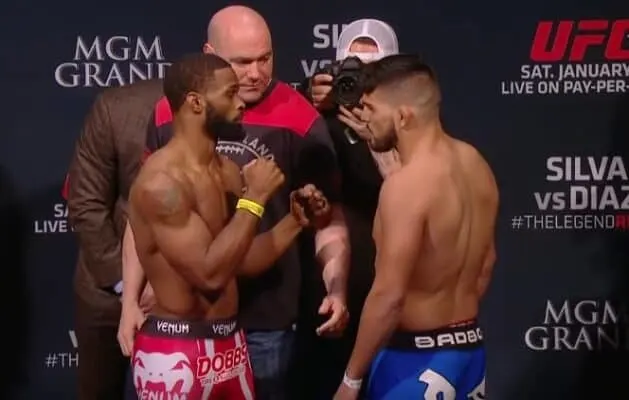
UFC catchweight bout (Gastelum missed weight)
Many unusual terms are used in the UFC, and one that you often hear is “catch weight fight.” You have probably heard this term before and generally understood it. However, as with many UFC rules, there is still an air of mystery, making it difficult to follow your favorite UFC fights. So, in simple terms, what is catch weight in the UFC?
The UFC sets up a catchweight fight when both fighters accept the new negotiated weight, discarding the weight limits of their division. Catchweight often occurs when one or both fighters cannot lose enough weight before the weigh-ins, meaning they are heavier than the maximum permitted weight.
You may be wondering how a heavier fighter can still fight if they didn’t follow the rules, giving them a clear advantage. This advantage is sometimes not worth it for the penalties that are also enforced on the overweight fighter. I will explain this, as well as other elements to a fighter’s weight limit, below.
What is Catchweight?
Catchweight refers to any weight limit in a fight that does not adhere to the traditional limits for weight divisions in the UFC. I will outline the traditional weight classes in more detail at the end of this article. This alternative weight limit strays from the original weight limit specified in the fight contract, but is agreed upon by both fighters prior to the bout.
The catchweight is usually set to the weight of the heavier fighter. For example, UFC 214 Bantamweight fight between Aljamain Sterling and Renan Barao became a catchweight fight with a 140lbs weight limit. Normally the Bantamweight division limits fighters to 135lbs, but Barao could not cut enough weight to reach 135lbs.
What is Catchweight Bout? (What Causes It?)
A catchweight bout simply refers to a fight where the participants have agreed on a catchweight instead of the limits of their weight division. This is a result of one or both fighters being unable to lose enough pounds before the weigh-ins, meaning they are heavier than the maximum allowable weight.
Having extra weight gives a fighter an advantage, which I will explain in more detail further down. Therefore, fighters try to achieve a weight as close as possible to the maximum for their weight division. One of the reasons why fighters don’t make their weight is that they simply misjudged how much weight they could lose before the weigh-ins.
Another reason is that it is medically unsafe for them to do so. This was the case in the example mentioned above between Sterling and Barao. Barao was hospitalized in his attempts to lose weight before his Bantamweight bout with Sterling. It was therefore decided by the Sports Commission that he would only be allowed to fight if the fighters agreed on a catchweight of 140lbs.
However, the decision to go ahead with a catchweight bout ultimately belongs to the fighter who did make weight. If they adhered to their contract but their opponent did not make weight, they have the power to choose between fighting and cancelling the bout. If the fight is cancelled, the fighter who did the right thing will usually get paid “some money” as compensation (click here for full quote from Dana White).
If the fighter chooses to accept the new weight limit, they have the opportunity to earn their show money, but will also automatically receive a bonus. This bonus is taken from the winnings of the fighter that did not make weight, which I will explain in more detail below.
What happens if a UFC Fighter is Overweight?
As I have mentioned, when a UFC fighter does not make weight (because they are overweight), the fight will either be cancelled, or will continue as a catchweight bout.
Given Two Hours to Qualify
Immediately following the weigh-in, the overweight fighter is still given the opportunity over the next two hours to lose more weight and qualify for the match. Fighters are allowed to weigh up to one pound heavier than the maximum weight for their division in a non-title fight, but if they are fighting for the title, weights must be precise.
Lose a Portion of their Earnings
If the fighter is still unable to make weight, the decision lies with the opponent who weighed in successfully. If this opponent agrees to fight at a catchweight, around 30% of the fighter’s earnings will go to their opponent for disadvantaging them.
Any bonuses, such as the ‘Fight of the Night’ bonus, will also automatically be given to their opponent. If the fight does not go ahead, the fighter who did not make weight will be fined a percentage of their show money.
No Recognition for Title or Ranking
When a fighter is overweight for a title fight but the fight remains on the card, the catchweight fight will no longer be for the title. This is because the new weight limit no longer reflects that weight division. Fighters who don’t make weight also do not receive points for that fight in the UFC ranking system.
Can You Fight Underweight UFC?
Any fighter is allowed to fight under the weight limit for their division. However, this gives them a disadvantage as their opponent will likely be as heavy as possible, and therefore more powerful, for that weight division. If you are too far underweight and your weight falls into the weight division below, you also cannot fight.
For example, a fighter in the Lightweight division can weigh up to 155lbs, but their weight cannot drop below 145lbs because this is the weight limit for the Featherweight division.
Can UFC Fighters Gain Weight After Weigh-In?
UFC fighters almost always gain weight after the weigh-in. This is because they want to be as heavy as possible for the fight.
It is common for fighters to lose as much weight as they can before a weigh-in by dehydrating themselves in the days beforehand. The theory stems from the fact that human beings are made of 60% water weight. By dehydrating the body through heat and no water intake, most water weight is lost through urination and sweat.
Therefore, after a fighter has successfully weighed in, they will regain their water weight by sipping electrolyte drinks over the next day. This alone can increase their weight by 10-15 pounds, according to Livestrong.com.
Fighters can also lose weight before a weigh-in through diet and exercise. They can then gain additional weight by eating more food, specifically carbohydrates, after the weigh-in.
How Many Days before a Fight is the Weigh-In UFC?
It can be very confusing as to when the UFC weigh-ins occur. This is because there are actually two ‘weigh-ins’. The first weigh-in is where the fighters’ weights are recorded. This occurs on the day before the fight, in the morning. The fighters are weighed somewhere in the hotel they are staying, and this event is overseen by press and UFC staff only.
The second weigh-in, which occurs the following day, is a ceremonial event. This is open to fans and is for entertainment purposes only. The fighters will be announced, will step onto a set of fake scales and their weight that was recorded the previous day is announced. By this stage, the fighters can be up to 10-15 pounds heavier than that.
What’s the Most You Can Weigh in the UFC?
UFC fighters are divided into 12 weight divisions, including eight for men and four for women. Each division has a weight limit, which is the most a fighter can weigh to participate in that division. These weight divisions are listed below.
| Weight Division | Maximum Weight |
| Heavyweight (men) | 265lbs |
| Light Heavyweight (men) | 205lbs |
| Middleweight (men) | 185lbs |
| Welterweight (men) | 170lbs |
| Lightweight (men) | 155lbs |
| Featherweight (men & women) | 145lbs |
| Bantamweight (men & women) | 135lbs |
| Flyweight (men & women) | 125lbs |
| Strawweight (women) | 115lbs |
As you can see, the heaviest division in the UFC for men is the Heavyweight. These fighters can be a maximum 265lbs at weigh-ins. The heaviest division for women is the featherweight, which has a maximum of 145lbs. Therefore the most a male fighter can weigh is 265lbs, and the most a female fighter can weigh is 145lbs, unless more weight divisions are added to the UFC.
However, this does not take into account the amount of weight each fighter gains after weigh-ins. This varies from person to person, but could be 10-15lbs depending on their size and how dehydrated they are. Ultimately, the heaviest fighter could potentially be around 280lbs during a fight.
LEARN MORE Get the full report on Why Is There A Weight Limit For UFC Heavyweight Fighters? FAQ
